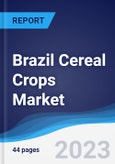Key Highlights
- The cereal crops market includes maize, wheat, rice (paddy), and barley. The scope of others includes sorghum, oats, millet, triticale, rye, mixed grain, buckwheat, canary seed, and fonio.
- The Brazilian cereal crops industry had total revenues of $29.8 billion in 2022, representing a compound annual growth rate (CAGR) of 24.4% between 2017 and 2022.
- Industry production volume increased with a CAGR of 8.6% between 2017 and 2022, to reach a total of 145.6 million tonnes in 2022.
- The industry growth is attributed to the growth in the production value of wheat and favorable government support to control crop prices.
Scope
- Save time carrying out entry-level research by identifying the size, growth, major segments, and leading players in the cereal crops market in Brazil
- Use the Five Forces analysis to determine the competitive intensity and therefore attractiveness of the cereal crops market in Brazil
- Leading company profiles reveal details of key cereal crops market players’ global operations and financial performance
- Add weight to presentations and pitches by understanding the future growth prospects of the Brazil cereal crops market with five year forecasts by both value and volume
Reasons to Buy
- What was the size of the Brazil cereal crops market by value in 2022?
- What will be the size of the Brazil cereal crops market in 2027?
- What factors are affecting the strength of competition in the Brazil cereal crops market?
- How has the market performed over the last five years?
- What are the main segments that make up Brazil's cereal crops market?
Table of Contents
Companies Mentioned (Partial List)
A selection of companies mentioned in this report includes, but is not limited to:
- Archer Daniels Midland Co
- Louis Dreyfus Company
- Bunge Limited
- Cargill, Incorporated








